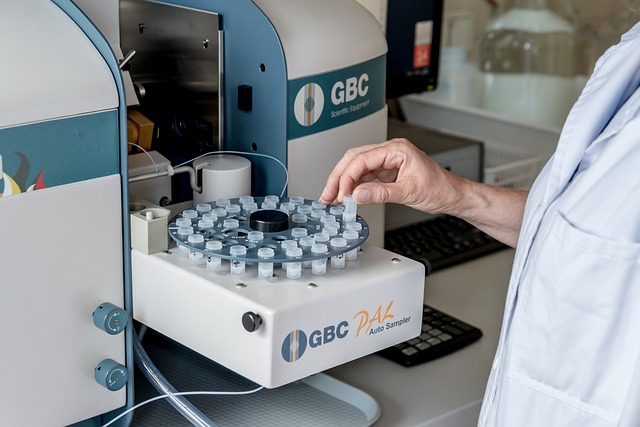Vitamin deficiencies often go unnoticed but can cause subtle yet distinct symptoms. Diagnosing these deficiencies requires blood tests that measure specific vitamin levels in the bloodstream, comparing them to established norms. Early detection through blood tests enables timely interventions like dietary changes or supplementation to restore optimal vitamin levels and overall well-being. Understanding test results helps healthcare professionals guide evaluations and treatment options, ensuring optimal nutritional status. Regular blood tests for vitamin deficiencies are a powerful health tool, enabling proactive management of diet gaps and minimizing health risks.
Uncover the power of a simple yet insightful blood test for vitamin deficiency. This comprehensive guide explores how this diagnostic tool can provide crucial health insights, revealing hidden imbalances. From understanding common types like iron and B12 deficiencies to interpreting test results, you’ll learn why accurate diagnosis is key. Discover the benefits of timely intervention, empowering you to take charge of your well-being effectively.
- Understanding Vitamin Deficiencies: Common Types and Symptoms
- The Role of Blood Tests in Diagnosing Vitamin Deficiencies
- Interpreting Results: What Do the Numbers Mean?
- Benefits of Accurate Diagnosis and Timely Intervention
Understanding Vitamin Deficiencies: Common Types and Symptoms
Vitamin deficiencies are common health issues that can often go unnoticed, as symptoms may be subtle or even absent in their early stages. However, understanding these deficiencies and their manifestations is crucial for accurate health insights. Common types include deficiencies in vitamins B12, D, and C, each with its own set of symptoms.
A lack of vitamin B12 can lead to fatigue, weakness, memory issues, and tingling in the hands and feet. Vitamin D deficiency may result in bone pain, muscle cramps, and a higher risk of fractures. Meanwhile, low levels of vitamin C can cause easy bruising, gum bleeding, and delayed wound healing. Recognizing these symptoms is essential, but identifying them accurately often requires a blood test for vitamin deficiency, enabling healthcare professionals to gain valuable insights into an individual’s overall health.
The Role of Blood Tests in Diagnosing Vitamin Deficiencies
Blood tests play a pivotal role in diagnosing and managing vitamin deficiencies. These laboratory analyses provide accurate health insights by measuring the levels of specific vitamins in your bloodstream. By comparing these levels against established norms, healthcare professionals can identify deficiencies or excesses with remarkable precision. A blood test for vitamin deficiency is a straightforward procedure that involves drawing a small sample of your blood, which is then analyzed using advanced techniques like spectrometry and enzymatic assays.
This diagnostic tool is crucial because symptoms of vitamin deficiencies can often be nonspecific or overlap with other conditions. For instance, fatigue, weakness, and irritability may signal a range of issues, making a blood test for vitamin deficiency essential to pinpoint the exact cause. Early detection through such tests enables prompt intervention, which can include dietary adjustments, supplementation, or targeted medical treatments to restore optimal vitamin levels and overall well-being.
Interpreting Results: What Do the Numbers Mean?
When interpreting the results of a blood test for vitamin deficiency, it’s crucial to understand what each number represents. The test typically measures the concentration of specific vitamins in your blood, indicating their levels. For instance, a low vitamin D level might suggest a deficiency, as this vitamin is essential for bone health and immune function. Similarly, iron, folate, or B12 deficiencies can be identified through corresponding blood markers.
Each vitamin plays a unique role in your body’s overall health, so the numbers provide valuable insights into your nutritional status. A healthcare professional will compare these results with established reference ranges to determine if your vitamin levels are within a healthy spectrum. Any deviations from this range could indicate a deficiency or excess, guiding further evaluation and potential treatment options, such as dietary changes or supplements, for a blood test for vitamin deficiency.
Benefits of Accurate Diagnosis and Timely Intervention
An accurate blood test for vitamin deficiency is a powerful tool that offers numerous benefits for your health and well-being. It provides insights into your body’s nutritional status, allowing healthcare professionals to make informed decisions. Early diagnosis through such tests enables timely intervention, which is crucial in preventing or managing conditions related to vitamin deficiencies. This proactive approach ensures that any gaps in your diet are addressed promptly, minimizing potential health risks.
By identifying specific vitamins that may be lacking, individuals can tailor their dietary choices and, if necessary, consult with specialists for supplementary support. Regular blood tests can monitor the effectiveness of these changes over time, ensuring optimal vitamin levels and promoting overall well-being. This personalized approach to nutrition is key in maintaining a healthy balance, especially as certain vitamin deficiencies may not always present obvious symptoms.
A blood test for vitamin deficiency is a powerful tool that offers valuable insights into an individual’s overall health. By understanding the common types, their symptoms, and interpreting the results accurately, individuals can take control of their well-being. Early diagnosis through timely blood tests enables prompt intervention, ensuring optimal health and preventing potential long-term issues. This simple yet effective method empowers folks to make informed decisions regarding their nutrition and overall wellness.
